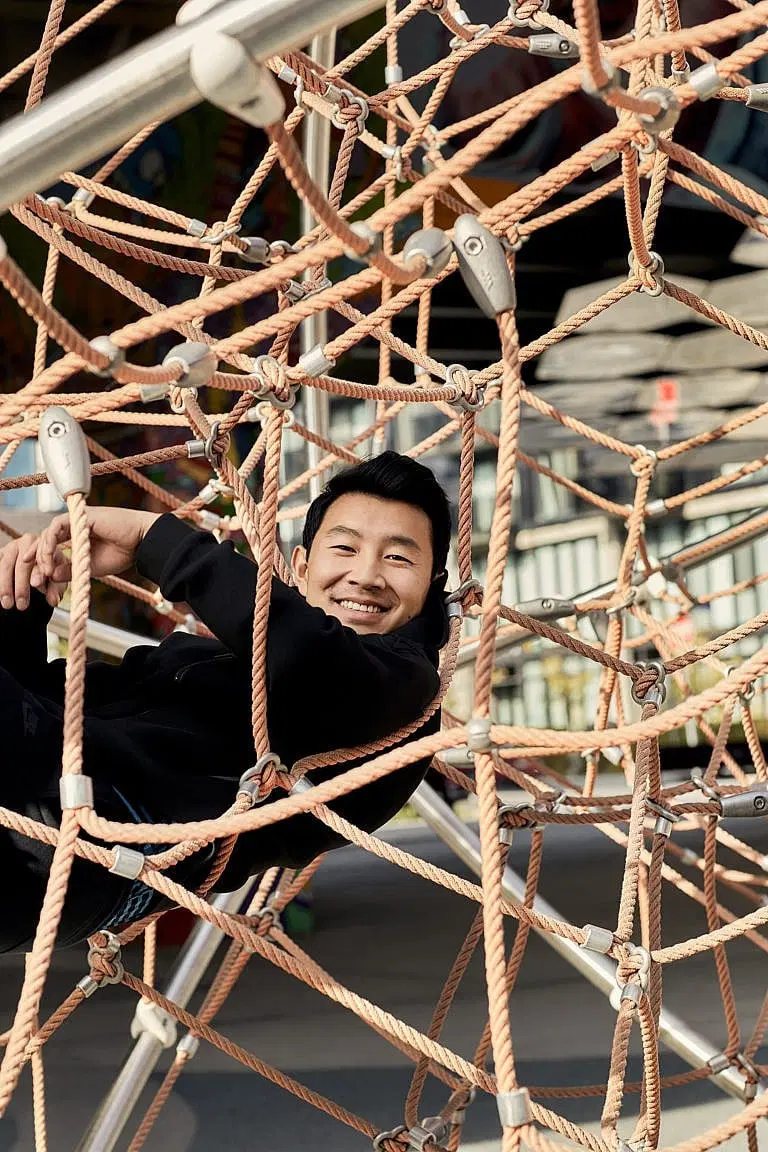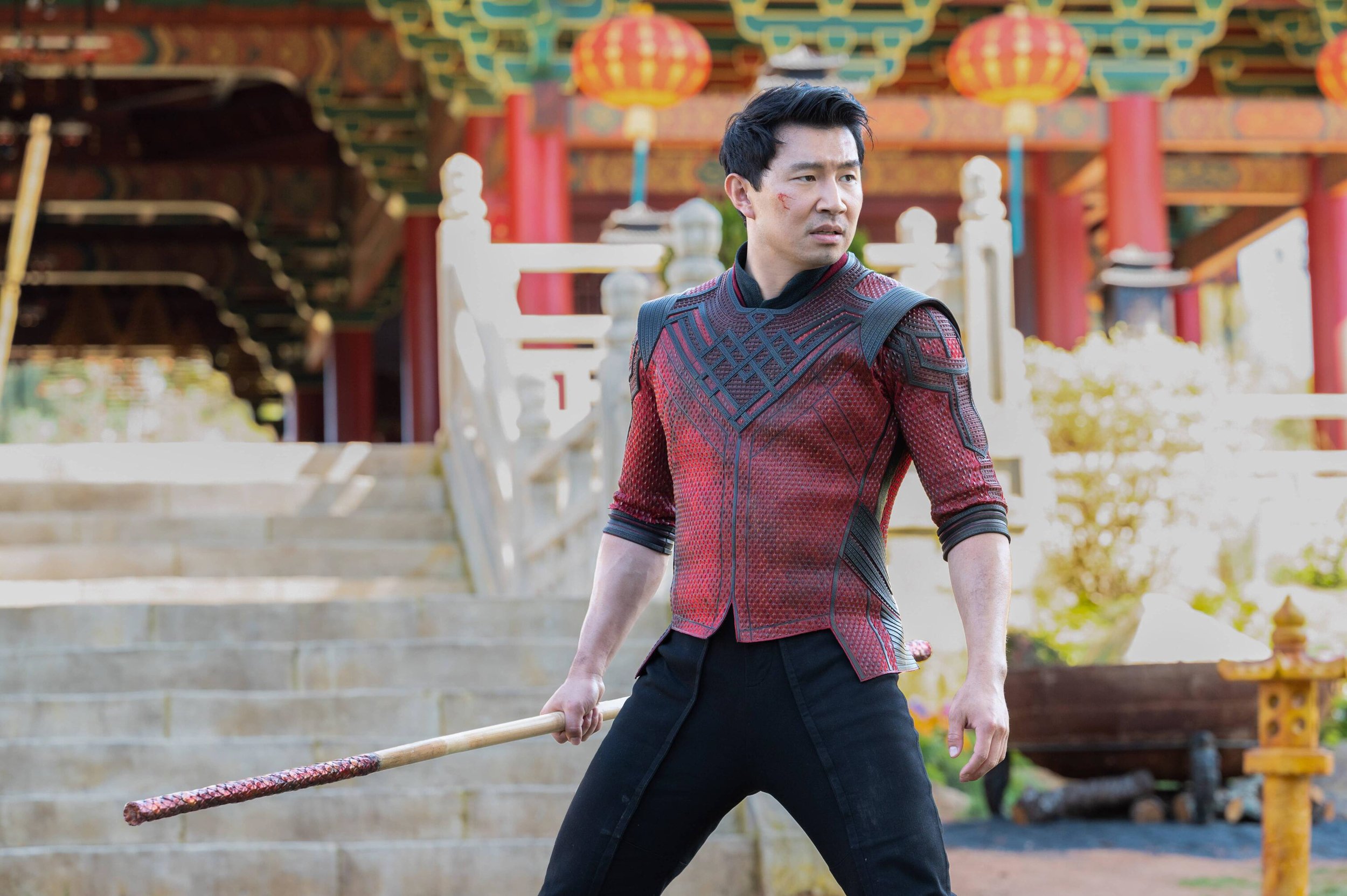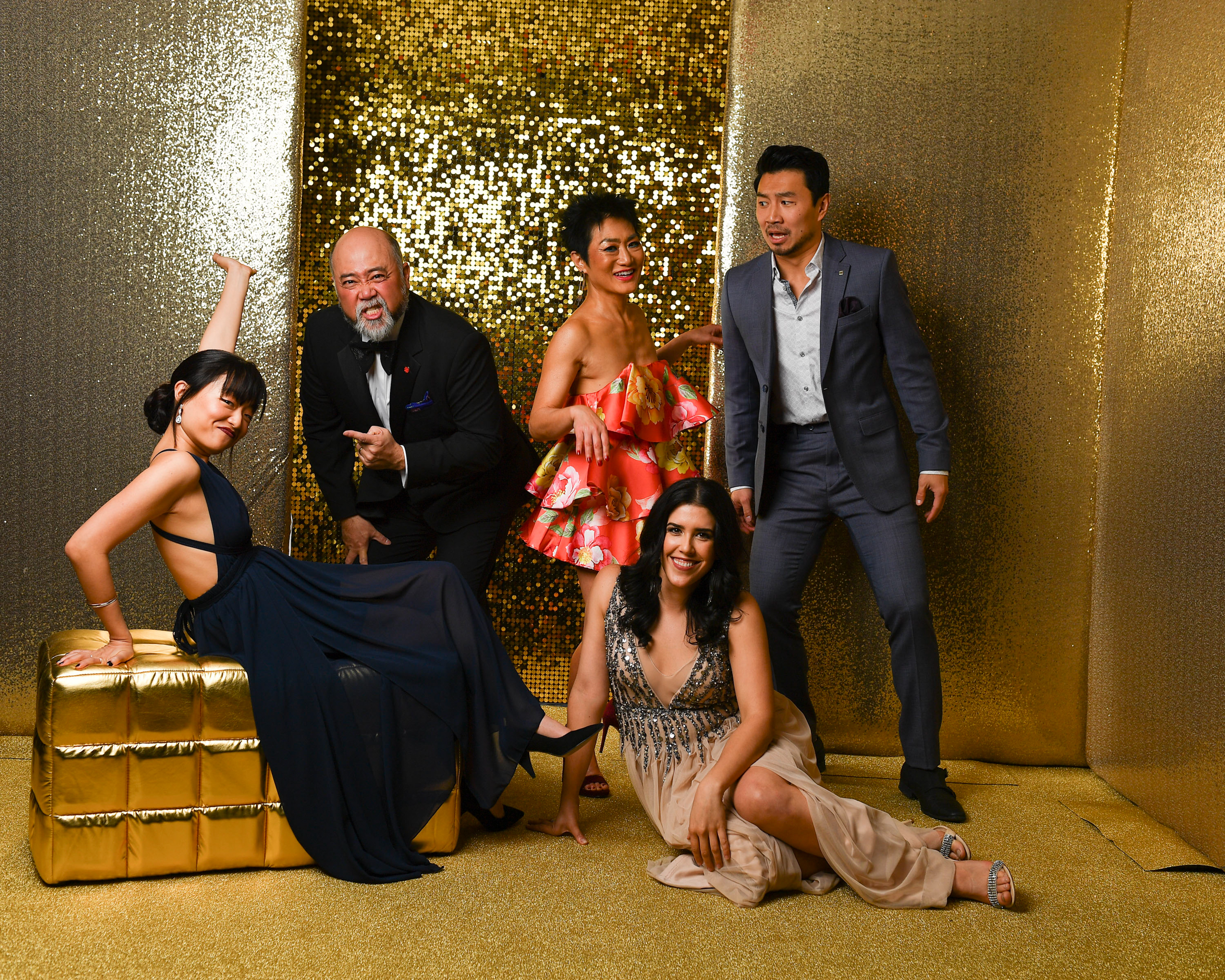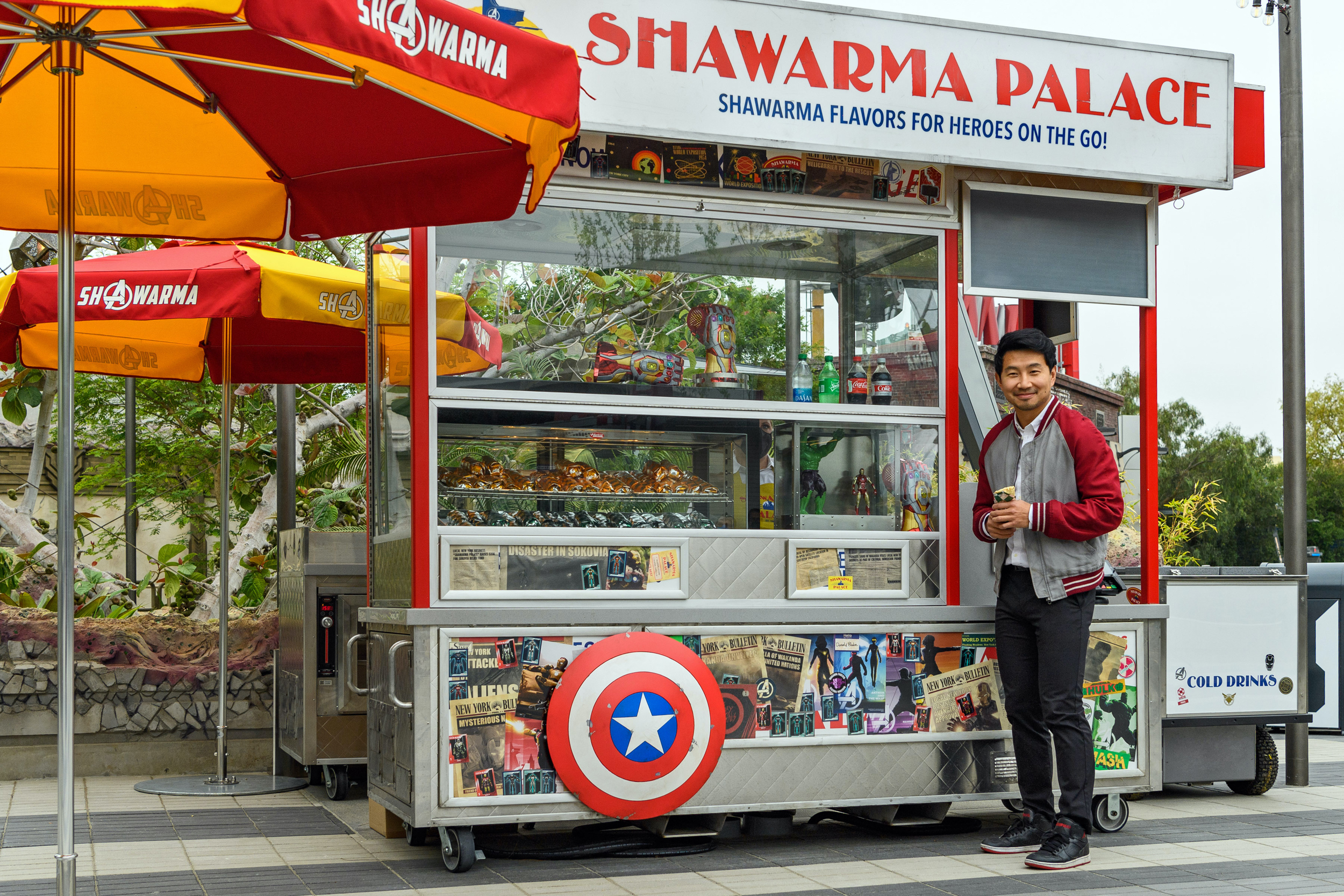Simu Liu is on the cusp of superstardom. But that isn’t his end game.
As Marvel’s first Asian superhero, Canadian actor Simu Liu is about to become a household name. But it’s not enough to succeed on his own; he wants to bring his community with him.

(Luis Mora)
Share
Two years ago, Simu Liu decided to host a Toronto screening of The Farewell in the style of a “Gold Open,” where people in the industry buy out theatres to help boost the opening numbers of films made by and starring Asian artists. In this case, Liu was looking to support director Lulu Wang and actor Awkwafina.
He first made the request for tickets through Cineplex the day before the screening but was refused on account of the short notice. So he rolled up to the theatre’s counter with friends the day before the show to buy tickets the old-fashioned way—from a cashier (who recognized Liu)—waiting an hour or so for them to be physically printed. And then he tweeted that 500 would be available the next day, first-come, first-served.
“We just thought we could manage it ourselves,” says Jason Chan, a childhood friend of Liu’s who is also an actor. “But clearly, we weren’t thinking.”
Hundreds showed up, flooding the Manulife Centre in downtown Toronto. The line snaked up two floors to the movie theatre, resembling an opening night at TIFF rather than a visit to an unspectacular theatre in a sterile office tower. Clement Chu, another friend of Liu’s who was asked to help with logistics and crowd control, called Liu, who was having dinner nearby before the show: “You need to get over here.” When Liu arrived, the crowd erupted, yelling his name and asking for autographs.
Days earlier, the actor then best-known for his role on the CBC sitcom Kim’s Convenience was announced as the lead for the Marvel movie Shang-Chi and the Legend of the Ten Rings, making him the first Asian superhero in a Marvel film.
For Chu, the scene at the Manulife Centre was a preview of the fame Liu now had within his grasp. The 32-year-old’s anointment as the next Marvel superhero breaks major ground for Asian-Canadian and Asian-American actors, not to mention the fact that it vaults Liu into the company of Robert Downey Jr., Scarlett Johansson and most of the Chrises (Evans, Hemsworth, Pratt). But the loud celebration of Liu as a trailblazer has sometimes drowned out the quieter complexities that come with carrying the mantle of “first.” Liu himself described it as a burden in a recent Interview magazine piece. It means Liu has to offer more than just himself—a multitude of experiences and in turn, expectations, are mapped onto him. He carries the weight of ensuring that there will be a “second” and “third” in his shoes, that there will be opportunities for those who follow in his footsteps. For him, it’s not enough to succeed on his own; he wants to bring his community with him, to hold open doors he had to pry open.

On the cusp of potentially becoming a household name, Liu is already well-known enough to be given spreads in Interview and Vanity Fair, while also gracing the covers of Men’s Health and Entertainment Weekly. His PR representative wouldn’t grant an interview for this profile unless Maclean’s guaranteed it would be a cover story. In the end, Liu answered questions by email.
He had recently lost both his grandparents, who died in quick succession in May. They cared for him the first five years of his life, after his parents left him in Harbin, China, to study at Queen’s University in Kingston, Ont. “One day, this stranger shows up at my door and tells me he’s my dad, and that he’s going to take me to Canada,” Liu told Maclean’s. “I just wanted to stay with my grandparents, who were the only parental figures I had known.”
Arriving in Kingston was “very disorienting,” he writes. He recalls crying at daycare because he didn’t understand English and couldn’t communicate with his caregivers. In a piece he wrote addressed to his parents for Maclean’s in 2017, Liu describes a strained relationship, which was partially a result of this early separation: “Perhaps, in the same way that you were strangers to me, your son also felt like a foreigner to you. That rift would only widen as I adopted the values and norms of a culture that you were unfamiliar with.”
READ: The marvel behind Marvel Studios: How a group of B-list comic stars took over the world
The stereotypical immigrant pressure to excel was very real for Liu, and he attended a private school that compounded the focus on academics and achievement, the University of Toronto Schools (UTS). There he met Ling Wong, a geography teacher whose story was, in some ways, parallel to his—she came to Canada at three from China, struggled with her parents’ expectations and veered off an expected path to live in tents in the North as a geologist before becoming a teacher. Liu stood out to her, not because he had the best grades but because he seemed to know how to be himself—he was more interested in the talent show and getting on the basketball team than he was in his marks. “When kids were freaking out right before a test, he would be just singing and dancing in the halls,” says Wong.
Wong told Liu he could continue playing sports in university, that grades weren’t the most important thing in life and that following your passion can be a route to a career. “For him, it was an eye-opener, because his parents were like, ‘You will go to university and get good marks and get a good job,’ ” says Wong.
Liu did go to Western University, for business school, and landed a coveted position at Deloitte, only to be laid off eight months later. Then he spotted a Craigslist ad for extras for the production of Guillermo del Toro’s Pacific Rim and, after landing on set, went all in. His early credits include an episode of Nikita, appearing in music videos (once as a stuntman, once as “office worker”) and odd jobs like posing as a stock photo model. The roles grew bigger—in 2015, he had a recurring part in the OMNI series Blood and Water—and he broke out as Jung on Kim’s Convenience, which premiered on CBC in 2016.

The sitcom about a Korean-Canadian family that owns a convenience store was based on a play by Ins Choi, and Jung Kim was a role Liu identified with, writing in 2017: “I am now playing myself on TV: a troubled kid, burdened by his relationship to his parents, trying to find his place in the world.”
Despite its growing popularity, Liu hustled while on Kim’s—cultivating relationships in Los Angeles, including with Wong Fu Productions, a digital production company with over three million YouTube subscribers, and co-writing his own short film with Tina Jung called Meeting Mommy, which showcased his abilities beyond comedy. “L.A. became the new territory for me, and I pursued it with so much drive and vigour partially because I knew that I could not rely on Kim’s to take my career where it needed to go,” Liu later wrote in a Facebook post.
Ziad Ek joined the cast of Kim’s Convenience in its third season as Omar, one of Jung’s co-workers at a rental car company. He admires Liu’s entrepreneurial approach to acting but couldn’t help noticing how exhausted it made him. “We made jokes that he was notoriously good at falling asleep on a dime just to recuperate,” says Ek. Shooting for Shang-Chi during the pandemic meant Liu worked on scenes for the show’s fifth and final season over nine days, a process that would normally be done over two months. “He was in every single scene of every single day, which is an insane amount of work—nobody does that,” says Ek. “He killed it.”
The show became a beloved part of the CBC landscape, winning awards and amassing a loyal fan base who named themselves #KimBits, first in Canada and then abroad as Netflix picked up the series. But it wasn’t without its critics. Journalist Dakota Kim wrote in the Los Angeles Times about a pattern where “cheap punchlines about race, ethnicity and nationality supplanted the observational humour that brought the series its legions of fans.” And over the years, discord behind the scenes had grown; despite being renewed for a sixth season, the show was unceremoniously cancelled in March. Cast members were called shortly before the public announcement, which cited showrunners Ins Choi’s and Kevin White’s decision to move on to other projects as the reason for the cancellation.
Liu initially posted on Twitter that he was “heartbroken.” In June, he blasted out a list of grievances in a lengthy Facebook post: lack of diversity in the writers’ room, being shut out of contributing to his character’s development, being paid a “horsepoop rate” and the fact that the only member of the cast getting a spinoff show was Nicole Power, a white woman.
When asked for comment, Jonathan Schwartz, director of communications for Kim’s Convenience, pointed to a press release stating that the reason for the show’s cancellation was that the “two co-creators confirmed they were moving on to other projects” and to a Globe and Mail story in which the show’s producer, Ivan Fecan, said that he “made the tough call that, without Ins, there is no show.” Schwartz also pointed to a June 6 Facebook post by Anita Kapila, a South Asian writer who worked on Kim’s Convenience, in which she acknowledged and named the women and people of colour with whom she worked on the show. CBC did not offer comment when asked.
READ: Kim’s Convenience: A TV first that doesn’t buckle under the pressure
For some, Liu’s post shattered the idea of Kim’s as an example of a truly diverse production. And for others, it read as a familiar story. “Your candour opens the possibility for much needed conversations in order to change harsh and unfair practices in the Canadian film and TV industry with regards to ‘diversity,’ top-down silencing, exclusion and exploitation,” wrote Canadian broadcaster, director and musician Sook-Yin Lee in the comments below Liu’s post.
Liu’s lengthy post is reflective of an emerging pattern for the actor—as his star has shone brighter, his voice has become louder on issues of race and representation. He penned a column on anti-Asian hate for Variety earlier this year. “Most disappointing of all, I’ve watched as you, the bystanders and witnesses, have stood idly by and simply not cared enough to speak up,” he wrote. “Most of you don’t even believe that racism against Asian people exists.”
His former teacher Ling Wong worries about this—“Say it in a nicer way, just so, you know, it doesn’t come back and bite you later,” she says—but she also admires how Liu has held on to his Asian identity. And so do others. “A lot of folks, when they start to get some acclaim, they’ll shy away from talking about difficult issues,” says Jason Y. Lee, founder of L.A.-based production company Jubilee Media. “It’s really cool when people see their platform as a responsibility and are deliberate about what they want to say and do with it, rather than just saying, ‘Hey, I’m just a star.’ ”
Lee and Chu both point to the extensive volunteer hours Liu puts in—from speaking engagements to charity basketball events to holding workshops with young actors. “I was like, ‘Dude, that’s insane that you’re spending time doing that,’ ” Lee recalls saying to Liu when he first heard about the workshops. Liu responded that he would have been able to progress so much more rapidly in his own career if only he knew what he knows now.
“Believing there [can only be one] Asian American in the room is such an antiquated idea,” says Lee. “As we grow the Asian-American community, the idea should not be, how do I get my slice of the pie? It’s, how do I actually make this pie much larger for our community, for our peers, for the next generation? That’s why I’m really proud of him.” He sees what Liu is doing as part of a multi-pronged approach to not only building on-screen Asian representation in Hollywood, but “having a seat at the table or making your own” in an industry that was very much designed for the white gaze.
Nathalie Younglai, a Canadian writer and director, has also made inclusion in the industry a big part of her work. In 2012, she founded BIPOC TV and Film and has mentored emerging filmmakers—including Liu—through the Toronto Reel Asian Film Festival. They first met in 2013, and when Liu started to see some success with Kim’s and decided to pitch a web series to the CBC about a couple who fall out of love, he asked Younglai to be part of the project. “That was his opportunity but he shared it with me,” says Younglai, who is a co-creator and showrunner of the project Hello (Again). “He’s very genuine in that way—he wants to lift up others.”

When asked which actors he admires, Liu pointed to Michael B. Jordan, Daniel Kaluuya and John Boyega. “I naturally gravitate to actors who present themselves as artists with a message who stand for social change,” writes Liu. He also mentioned the late Chadwick Boseman, star of the immensely popular Marvel film Black Panther. Shang-Chi is already being described as the “Asian Black Panther” in its effort to centre Asian voices in a story about a Chinese superhero. The film is out in early September, and the trailer promises as thrilling a ride as Black Panther: we see Liu falling multiple floors from a building, hanging off a speeding bus, facing a dragon underwater and dealing with some big bad daddy issues, with Shang-Chi’s father, Wenwu (played by Tony Leung Chiu-wai), as the villain.
While there is a celebratory air ahead of the film’s release, there are also nerves. “When’s the last time [Marvel] failed?” says Chu. “You could then flip it around to say, well, that’d be kind of scary if this is the first one that fails.” But Liu’s perpetual hustle means he’s already working on projects beyond Shang-Chi, including the CBC web series Hello (Again), a romantic film called One True Loves based on a bestselling book, and the publication of a memoir in 2022. And he has ideas about the kinds of stories that he thinks still need to be told about Asian history in North America, like how Chinese workers built the railroads in North America. “We’ve been here and contributing to the culture and the history for over 100 years,” writes Liu in his email to Maclean’s. “And it’s time people stopped treating us like perpetual foreigners.”
This article appears in print in the September 2021 issue of Maclean’s magazine with the headline, “Almost famous.” Subscribe to the monthly print magazine here.